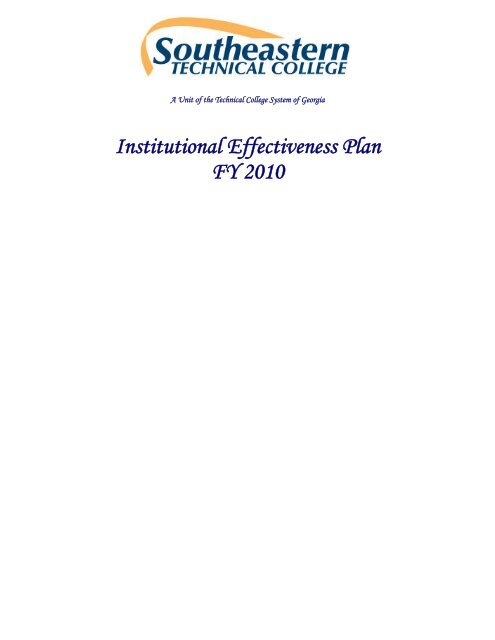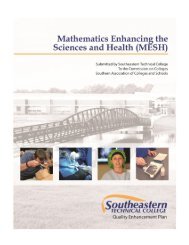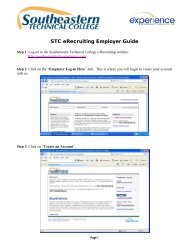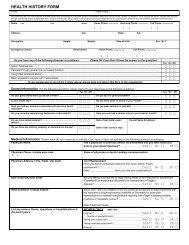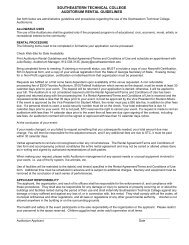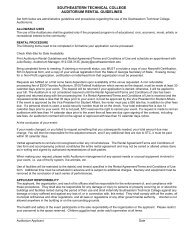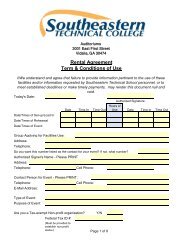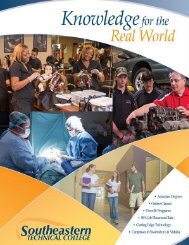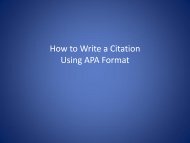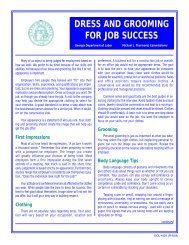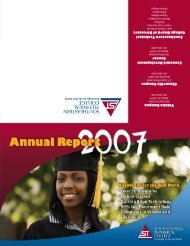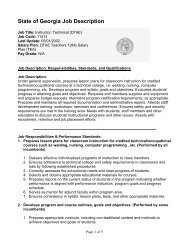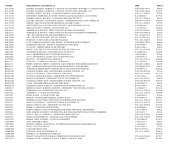IE PLAN - STC Internal Web Home - Southeastern Technical College
IE PLAN - STC Internal Web Home - Southeastern Technical College
IE PLAN - STC Internal Web Home - Southeastern Technical College
- No tags were found...
Create successful ePaper yourself
Turn your PDF publications into a flip-book with our unique Google optimized e-Paper software.
A Unit of the <strong>Technical</strong> <strong>College</strong> System of GeorgiaInstitutional Effectiveness PlanFY 2010
Table of ContentsIntroductionDivisions, Departments, Units, Committees and TeamsOffice of Institutional EffectivenessThe Institutional Effectiveness Reviewers (T<strong>IE</strong>R)Institutional Effectiveness FlyerAnnual Review: MissionFive-Year Strategic PlanStrategic Planning Advisory Group (SPAG)Annual Review/Revision of Strategic Plan: Goals and ObjectivesMaster Campus PlanProgram Development, Analysis, and Termination PlanTCSG Performance Accountability System (PAS)Six-Year Comprehensive <strong>Internal</strong> Program ReviewSix-Year External Performance Accountability Review (PAR)Integrated Post Secondary Education Data System (IPEDS)Accreditation and OversightAnnual Review of Commission on <strong>College</strong>s (COC) Principles of AccreditationProgram Specific AccreditationsAnnual Review of TCSG StandardsPlanning and EvaluationCustomer EvaluationsAnnual Faculty and Staff EvaluationsStaff/Professional Development PlansOn-Going Strategic Planning - Annual PlanningThe SPIRIT SystemDivision Goals and ObjectivesAnnual Plan – SPIRIT SystemEducational Program Effectiveness ProcessStudent Learning: Graduate Academic ExcellenceAssessment & Planning ReportsEnd-of-Year Assessment of the Annual Plan and Budget RequestsAnnual Plan ReportUtilizing the Annual Plan Report for ImprovementsStudent Learning Outcomes ReportBudget Request ReportsFinancial Planning & FundingFinancial PlanOperating BudgetPAS Budget RequestMatching Equipment FundsMajor Repair & Renovation Funds (MR&R)Perkins FundsOne-Year Funding Application for Federal FundsSummaryInstitutional Effectiveness Plan
significant elements in determining whether or not <strong>Southeastern</strong> <strong>Technical</strong> <strong>College</strong> is fulfilling its mission.<strong>Southeastern</strong> <strong>Technical</strong> <strong>College</strong> not only assesses its programs and services, but the entire assessment process as well. The Institutional Effectiveness Reviewers Team (T<strong>IE</strong>R) is composed of full-time representativesof student affairs, general education, and program instruction, support staff representatives, the Director of Institutional Research and Planning, the Institutional Analyst/Research Coordinator, and the Vice President ofInstitutional Effectiveness. T<strong>IE</strong>R meets periodically to review surveys, analyze results and other factors affecting the surveys and makes recommendations for improvements of data collection and reports. T<strong>IE</strong>R reviewsthe Institutional Effectiveness Plan and advises the Vice President of Institutional Effectiveness of any needed revisions. T<strong>IE</strong>R focuses on which assessment tools will improve student learning and services. T<strong>IE</strong>R alsofunctions as a channel to help improve communications to, from, and between the faculty and the <strong>College</strong>. (T<strong>IE</strong>R Program of Work/Roster/Agenda/Minutes) T<strong>IE</strong>R reviews assigned compliance certification narrativesand documents.Institutional Effectiveness FlyerThe Institutional Effectiveness Flyer is developed by the VP<strong>IE</strong> periodically to keep faculty, staff, and Local Board members informed. Topics vary from accreditation to motivation. The <strong>IE</strong> Flyer serves as acommunication/education tool.Annual Review: Mission<strong>Southeastern</strong> <strong>Technical</strong> <strong>College</strong> (<strong>STC</strong>) involves the faculty, administration, occupational advisory committees, and the local Board of Directors in the annual review of its mission statement. First, it is reviewed by the<strong>College</strong>'s administration. The Vice President for Institutional Effectiveness (VP<strong>IE</strong>) presents it at each divisional meeting. The faculty members then present it to their occupational advisory committees. It then goes tothe Local Board of Directors. The purpose of this review is to assure that the institution is meeting its educational commitments and that the mission statement is accurate, complete, clear, and concise.If changes to the mission statement are suggested, the <strong>College</strong>'s administration will draft the revision; however, if major changes are recommended, it is forwarded to the Strategic Planning Advisory Group (SPAG) forreview. After the revision is complete, the draft mission statement is sent to the Student Leadership Council for input. Once the draft is approved by the <strong>College</strong>'s administration, it is referred to the faculty'soccupational advisory committees and the <strong>College</strong>'s Local Board of Directors for review and approval. After it is approved at the local level, the mission statement is forwarded to the Office of the <strong>Technical</strong> <strong>College</strong>System of Georgia. It is then sent to the State Board of the <strong>Technical</strong> <strong>College</strong> System of Georgia for review and approval.At any point in the review process, the mission statement may be returned to the <strong>College</strong>'s administration with recommendations for further modification. When the mission statement is sent to the State Board of the<strong>Technical</strong> <strong>College</strong> System of Georgia for approval, the <strong>College</strong>'s accrediting agency is notified. This review process ensures that a relevant mission statement is maintained which accurately describes the <strong>College</strong>'sactivities.<strong>Southeastern</strong> <strong>Technical</strong> <strong>College</strong> is challenged to continue to review the mission statement annually to ensure that it represents the official statement of the <strong>College</strong> and that it is relevant to the current and future needsof the business and industrial community. The mission of the <strong>College</strong> must continue to be accurately communicated through appropriate publications.<strong>Southeastern</strong> <strong>Technical</strong> <strong>College</strong> actively involves the business and industrial community, faculty, staff, and administration in the annual review process. Such involvement ensures that the mission of the <strong>College</strong>remains sensitive to the changing needs of the community. (President’s Review Calendar & Mission Process)Five-Year Strategic PlanA comprehensive 5-Year Strategic Plan aligned with the TCSG Strategic Plan is developed by the <strong>Southeastern</strong> <strong>Technical</strong> <strong>College</strong> faculty, staff, Local Board of Directors, and business and industry leaders. This planis based on an in-depth situational analysis that formally examines the external and internal environments in relation to the <strong>College</strong>’s Mission, Goals, and Objectives. Strategic goals and objectives are established thatinclude all functional areas of the college. The functional areas include the Provost, Academic Affairs, Administrative Services, Economic Development, Institutional Effectiveness, Student Affairs, InstitutionalAdvancement, and Marketing and Public Relations. The Institutional Effectiveness Division is responsible for facilitating the Strategic Plan development and revision. (President’s Review Calendar & Strategic Planning)Strategic Planning Advisory Group (SPAG)The SPAG team assists with the development of the 5-Year Strategic Plan. SPAG is composed of representatives from different areaa of the <strong>College</strong>. SPAG reviews the in-depth situational analysis and utilizesenvironmental scans, demographic profiles, labor market trends, and other resources to help determine the future direction of the <strong>College</strong>. SPAG reviews the mission, vision, and strategic plan goals and objectives torecommend any needed updates.Annual Review/Revision of Strategic Plan: Goals and ObjectivesThe institutional Goals and Objectives, included in the <strong>College</strong>’s Strategic Plan, are reviewed annually and revised as needed. Progress toward strategic goal and objective accomplishment is documented annually.The Institutional Effectiveness Division coordinates faculty and staff in these activities. (President’s Review Calendar& Strategic Planning)Master Campus PlanA campus-wide plan for new facilities and for facility renovations is prepared every three years and is reviewed/revised annually. The Master Campus Plan is the result of administrators and faculty planning for newand/or existing program/services expansion, modification, and/or deletion. Plans for facilities, equipment, personnel, furnishings, and supplies, etc. are included in in each year’s capital outlay request. State fundsrequired for project implementation are requested annually from the <strong>Technical</strong> <strong>College</strong> System (TCSG) through the <strong>College</strong>’s submission of the Performance Accountability System (PAS). The Master Campus Plan isreviewed and approved by the Executive Council and the Local Board of Directors. The Master Campus Plan is submitted to TCSG and the State Board of the <strong>Technical</strong> <strong>College</strong> System for its information. (President’sReview Calendar & Master Campus Plan)Program Development, Analysis, and Termination Plan<strong>Southeastern</strong> <strong>Technical</strong> <strong>College</strong>, as part of the <strong>Technical</strong> <strong>College</strong> System of Georgia, operates under a system that revolves around quality enhancement of programs and services. In fulfilling the mission of providing"...an innovative, educational environment for student learning through associate degree, diploma, and technical certificate of credit programs; adult and continuing education; and customized training and servicesfocused on building a well-educated, globally competitive workforce for <strong>Southeastern</strong> Georgia," it is necessary to continually assess the needs of the business community we serve and the programs we provide inorder to develop, maintain, or terminate programs that meet those needs. Discovering, developing, analyzing, improving, and continuing programs and even terminating inefficient programs are constant challenges for<strong>Southeastern</strong> <strong>Technical</strong> <strong>College</strong> and its ongoing strategic planning process. The <strong>Southeastern</strong> <strong>Technical</strong> <strong>College</strong> Program Development, Analysis, and Termination Plan is designed to help improve the institutionaleffectiveness of the <strong>College</strong> by providing an outline that identifies the need for program development, scrutiny, preservation, and erasure, as well as procedures to facilitate implementation of the plan. Academic Affairsis responsible for program development, analysis, and termination. The <strong>IE</strong> office supplies input as needed. This plan summarizes the broad phases involved in establishing, evaluating, maintaining, and terminatingprograms at <strong>Southeastern</strong> <strong>Technical</strong> <strong>College</strong>. (Program Development, Analysis, and Termination Plan)TCSG Performance Accountability System (PAS)The <strong>Technical</strong> <strong>College</strong> System of Georgia’s institutional effectiveness process, the Performance Accountability System (PAS), is a management process that annually measures performance on a prescribed set ofmeasures and plans for continuous quality improvement throughout the <strong>College</strong>. PAS evaluation, planning, and budgeting processes are completed for educational program groupings and for the <strong>College</strong>. Additionally,each functional area measures performance annually and plans for improvements based on assessment results. The program and <strong>College</strong> information is recorded in the PAS database, and the functional unitinformation is recorded in a local database. <strong>Southeastern</strong> <strong>Technical</strong> <strong>College</strong> faculty and administrative staff participate in this evaluation, planning, and budgeting process for PAS, which is coordinated by theInstitutional Effectiveness Division in cooperation with the Academic Affairs Division and other divisions of the <strong>College</strong>.During the budgeting phase, the PAS database is used to prepare the <strong>College</strong>’s budget request for state improvement funds projecting two years into the future. Budgeting ties the money requested to desiredimprovements. Funding is requested from the state for additional personnel, equipment, operations, capital outlay construction, and capital outlay equipment. The capital outlay construction requests, submitted toTCSG through the PAS software, are included in the current Master Campus Plan. The PAS budget request reflects the synthesized and prioritized equipment needs of the President and administrative divisions anddepartments: Provost, which includes Facilities Management, Information Technology, and Adult Education; Administrative Services; Economic Development Programs; Institutional Advancement; Public Relations,and Marketing; Institutional Effectiveness; Academic Affairs, which includes Learning Support, General Education, and individual program groupings; and Student Affairs.The Performance Accountability System (PAS) was developed by the <strong>Technical</strong> <strong>College</strong> System of Georgia as a result of the organization’s commitment to the continuous enhancement of the quality and effectivenessof programs and services.The Performance Accountability System (PAS) is composed of four distinct, but interrelated modules: program assessment, community needs assessment, planning, and budgeting.The first module of the Performance Accountability System is based on the assessment of the effectiveness of the <strong>College</strong>’s programs that culminate in a technical certificate of credit, a diploma, or an associatedegree. All program groups at each campus conduct level one analysis annually.The second module, the community needs assessment, is intended to assist in determining future needs for program improvement, modification, phase-out, expansion, or start-up.The third module of the Performance Accountability System is planning. Planning is a collaborative activity building on input from all staff, long-range plans, and a thorough analysis of the college’s current situation.The fourth module of the Performance Accountability System is budgeting. Budget requests address those needs identified through internal analysis and improvement planning processes.<strong>Southeastern</strong> <strong>Technical</strong> <strong>College</strong> completes an annual evaluation of Performance Accountability, an annual improvement plan and budget, and an application for federal funds.
Even though data supplied through PAS reports may accurately describe the <strong>College</strong>’s effectiveness, there is still a need for human interaction to validate self-evaluations of standard operating procedures and to addcritical analysis to the interpretation of regular operations. It was the recognition of this need that propelled the creation of the Performance Accountability Review (PAR) process.Six-Year Comprehensive <strong>Internal</strong> Program ReviewAn internal, comprehensive review of the <strong>College</strong>’s academic programs is conducted every six years in preparation for the Performance Accountability Review (PAR). This review is coordinated by the Vice President ofInstitutional Effectiveness; facilitated by the Vice President of Academic Affairs and conducted by the faculty who evaluate the following:• classroom and/or lab environment/s• equipment• PAS measures/benchmarks• data for program enrollment• graduates and placement• student records• student success rates• quality of instructional materials such as syllabi and lesson plansThe results of the evaluations are utilized for continuous improvement and identifying specific needs in the instructional process, physical facilities, equipment, and fiscal needs for future improvements. (President’sReview Calendar & <strong>Internal</strong> Program Review Compliance Audit Checklist)Six-Year External Performance Accountability Review (PAR)An external, comprehensive on-site review is conducted by a team of Georgia technical college presidents, faculty, staff, and selected TCSG personnel every six years. The Review is the capstone of the <strong>Technical</strong><strong>College</strong> System of Georgia Performance Accountability System (PAS). The PAR serves several purposes including verification of state standards’ implementation and monitoring and improvement planning for federalcompliance.The PAR findings are provided to <strong>Southeastern</strong> <strong>Technical</strong> <strong>College</strong>’s President, faculty, and staff, as well as the TCSG Commissioner. The President and the staff prepare a corrective action plan response for anyrecommendation made by the PAR team. The Commissioner reviews and issues comments regarding the corrective action plan. The <strong>College</strong> advises the PAR team and TCSG when the corrective action plan hasbeen completed.The last PAS report submitted to the State Office is used as the information base for PAR. If a PAR is scheduled for the period of April through May, the <strong>College</strong> may choose to be evaluated under either the prior ornew PAS data submission.By combining a peer review with the <strong>College</strong>’s self-evaluation, the PAR brings the highest level of leadership into the determination of performance accountability.A copy of the PAS Annual Plans, the PAR Report, Institutional Response, and Commissioner’s letter are filed by the <strong>Technical</strong> <strong>College</strong> System of Georgia as documentation of state monitoring required for federalcompliance.The PAR Measures include college wide measures in regard to admission procedures, transfer procedures, work ethics, marketing, warranty, and catalog and student handbook.PAR also evaluates program compliance measures including:• program structure/curriculum• instructional content• employability skills-work ethics• advisory committee• health and safety• warranty of degree, diploma, and technical certificate of credit graduates• online course program delivery modePAR also measures core requirements for the one-year funding application which include:• student attainment of academic skills• student attainment of vocational/technical skills• student graduation• student placement• nontraditional enrollment• nontraditional graduation• instructional program improvement• individual/business evaluation of program/services• continuous improvement evaluation• barriers for special populations• expenditure of funds for non-traditional training and employment• professional development• budget complianceIntegrated Post Secondary Education Data System (IPEDS)<strong>Southeastern</strong> <strong>Technical</strong> <strong>College</strong> complies with Section 490 of the Higher Education Amendments of 1992 (P.L. 102-325) which requires that “…institutions will complete surveys conducted as part of the IntegratedPostsecondary Education Data System (IPEDS)…in a timely manner and to the satisfaction of the Secretary.”IPEDS, established as the core postsecondary education data collection program for the National Center for Educational Statistics (NCES), is a system of surveys designed to collect data from all primary providers ofpostsecondary education. IPEDS is a single, comprehensive system designed to encompass all institutions and educational organizations whose primary purpose is to provide postsecondary education. The IPEDSsystem is built around a series of interrelated surveys to collect institution-level data in such areas as enrollments, program completions, faculty, staff, and finances.IPEDS also enables <strong>Southeastern</strong> <strong>Technical</strong> <strong>College</strong> to compare itself to peer institutions by generating reports using selected IPEDS variables of interest.Accreditation and OversightAnnual Review of Commission on <strong>College</strong>s (COC) Principles of AccreditationAnnually, divisions review assigned sections of the COC Principles to determine compliance with evaluative criteria and to identify/locate required documentation. Special teams may also review assigned sections ofthe COC principles and provide input. Results of the reviews are utilized as individuals ultimately determine compliance with related measures included within the COC Principles of Accreditation. (President’s ReviewCalendar & COC Compliance Review Assignments)Program Specific AccreditationsPrograms with specialized accreditations are monitored by Academic Affairs. The Institutional Effectiveness Office assists with the coordination of self-studies and visits.Annual Review of TCSG StandardsInstitutional, General, and Program StandardsAnnually, administrators of the functional units review assigned sections of the TCSG Institutional Standards to determine compliance with evaluative criteria and to identify/locate required documentation. Results ofthe reviews are utilized as individuals ultimately determine compliance with standard related measures included within the <strong>Technical</strong> <strong>College</strong> System.Course development or standards/program guide development, review, and revision are crucial tasks that the <strong>Southeastern</strong> <strong>Technical</strong> <strong>College</strong> faculty embraces on an annual basis. Learning Support faculty along withthe General Education/Learning Support Advisory Committee review General Education/Learning Support course guides and program faculty and all program Advisory Committees review their program standardsincluding its general education component to determine compliance with evaluative criteria and identify/locate required documentation.Courses in the degrees, diplomas, and technical certificates are developed through a process known state-wide as the Instructional Faculty Consortium Committee process (IFCC). The course/program development isappropriate to higher education.Programs with award levels of <strong>Technical</strong> Certificate of Credit, Diploma, and Degree are revised on a four-year cycle. The revision process is designed to meet the needs of business and industry and students enrolled
in the programs. The process takes an average of eight to twelve months to complete and implement.Steps involved in the revision of a credit program include:• The State <strong>Technical</strong> Committee meets to determine if competencies need to be added or deleted from the existing program. State <strong>Technical</strong> Committee recommendations are presented to theInstructional Faculty Consortium Committee (IFCC).• Local program advisory committees review program standards annually to determine if changes are needed.• The IFCC meets to review State <strong>Technical</strong> Committee recommendations and present local advisory committee recommendations. Also, the IFCC determines the courses where the new competenciesare to be placed and the amount of instructional contact hours needed to meet these competencies. The IFCC recommends the newly revised program outline and forwards to the Office of <strong>Technical</strong>Education at TCSG.• The curriculum program specialist working with the program being revised develops a Probe containing recommended changes in areas of course competencies, contact hours of instruction, credithours of instruction, course name, course number, course pre/co-requisites, and course descriptions.• The Probe is approved by the Director of Instructional Support Services, posted on the TCSG website, and forwarded to all college presidents for review and comment. The <strong>College</strong> response includesinput from local faculty, instructional supervisory personnel, and the <strong>College</strong> President. A Probe response form from the President of the <strong>College</strong> is then forwarded back to the Director of InstructionalSupport Services at TCSG.• The Director compiles responses and presents findings and Probe to the Vice President of Academic Affairs/President Ad Hoc Standards Committee for review and approval. If approved, the Probe isthen presented to the full Presidents Council of TCSG for approval.• If this group does not approve changes then the process reverts back to the IFCC group (step 2) for further work and is reintroduced to step 5.• The final recommendation on program revisions is presented to the State Board of the <strong>Technical</strong> <strong>College</strong> System of Georgia for approval.• Once program revisions are Board approved, then the working committee comprised of program faculty work to develop written guide materials that reflect program changes under the facilitation of thecurriculum program specialist for that program.• The curriculum program specialist compiles new program material and program standards changes into the TCSG format and posts them on the TCSG website.• <strong>College</strong>s approved by TCSG to offer the program implement new program.(President’s Review Calendar; TCSG Standards Review Audit Checklist; TCSG Program Revision Calendar)Planning and EvaluationPlanning and evaluation is a major component of the effective functioning of the divisions and departments of <strong>Southeastern</strong> <strong>Technical</strong> <strong>College</strong>. Evaluations used in the planning process within the different divisionsmay include:• Adult Education Surveys• Advisory Committee Program Evaluations/Recommendations• Audit Reports (State, Foundation, & Financial Aid)• Certification Exam Reports/Results• Auditorium Satisfaction Survey• General Core Competency Assessment (GCCA)• Work Ready Assessments• Comprehensive Program Assessment (Project, Portfolio, exam, etc.)• Commission on <strong>College</strong>s Principles (COC)• Commission on <strong>College</strong>s Reports/Responses/Visits• Committee Approvals/Minutes• Comparison Percentage Reports for Credit Course Evaluations• Continuing Education Course Evaluation Reports• <strong>Technical</strong> <strong>College</strong> System of Georgia Standards (TCSG Institutional, General Program, & Program Standards)• TCSG End-of-Year Data• Division Agendas/Minutes• President’s Review Calendar• Employee Annual Performance Evaluation• Employer Survey• Executive Council Approval/Minutes• Faculty/Staff Perception of Services Survey/Reports• Galileo Report• Georgia Online Database (GOLD) Report• Graduate Survey• Georgia Virtual <strong>Technical</strong> <strong>College</strong> (GVTC) End-of-Year Data• Information Technology Plan• Integrated Postsecondary Education Data System (IPEDS)• Internship Report• IPEDS Financial• Job Placement Report• Knowledge Management System (KMS) Datacenter Reports• Instructional Safety, Health, and Lab Management Checklists• Instructor Observations• Leaver Survey• Library Survey• Library Statistics Report• Licensure Exam Reports/Pass Rates• Local Board Approval/Minutes• Marketing Survey• Monthly Divisional Budget Reports• New Student Survey• Performance Accountability Review (PAR)• Performance Accountability System (PAS) Reports for Programs• Physical Inventory• Program specific accreditation decisions• Program specific licensure/accreditation/certification standard and evaluation• Course Evaluations: Traditional, Polycom, On-line, Clinical, and Medical Assisting• Self-Study Reports• Staff Development Plan/Activity Reports• <strong>Southeastern</strong> <strong>Technical</strong> <strong>College</strong> Annual Report• Student Perception of Services SurveyThe results of these ongoing evaluations allow each division the opportunity for improvement, more effective planning, and prioritizing available budget resources.Customer Evaluations<strong>Internal</strong> and external customer evaluations are completed for departments, divisions, and the <strong>College</strong>. The customer survey results are used during the evaluation and planning phases of the institutional effectivenessprocess and during the preparation of both the <strong>College</strong>’s Annual Plan and Budget and the <strong>College</strong>’s Strategic Plan. Customer evaluation findings are continuously reviewed and action is taken as needed. AcademicAffairs, Student Affairs, Job Placement, Economic Development, Continuing Education, and Institutional Effectiveness are responsible for these evaluations. Findings are used during the evaluation of programs,functional units, and the <strong>College</strong>.Examples of evaluations administered regularly may include but are not limited to:• Business and Industry Needs Assessments• Auditorium Satisfaction Survey• Continuing Education Course Evaluations• Employee Annual Evaluations• Employer Surveys• Faculty & Staff Perception of Services Surveys• Graduate Exit Interviews• Graduate Follow-up Surveys• Individual Programs Needs Assessments• Lab Management Checklists
• Leaver Surveys• Marketing Surveys• New Student Surveys• Online Course Evaluations• Special Services Surveys• Student Perception of Services Surveys• Supervisor Evaluations• Traditional Course Evaluations• Clinical Course Evaluations• Online Faculty Satisfaction Survey(President’s Review Calendar & Surveys, Evaluations, Assessments)Annual Faculty and Staff EvaluationsEach <strong>Southeastern</strong> <strong>Technical</strong> <strong>College</strong> faculty and staff member is evaluated annually by his/her supervisor prior to April 30. During the evaluation, a review is made of the previous individual staff development plan, thedepartment and/or individual annual plan, and if appropriate, customer evaluations, as well as other evaluation findings. Faculty and staff design staff development activities and plans based on results of variousevaluations. (Staff Evaluation Form)Staff/Professional Development PlansAnnually, each full-time member of <strong>Southeastern</strong> <strong>Technical</strong> <strong>College</strong>’s faculty and staff participates in planning staff development activities. The staff development plan includes required activities such as those relatedto state requirements and accreditation, as well as selected activities based on institutional needs, individual needs, and results from evaluations. The administrators of the functional areas assist in facilitating theplanning process.Staff development is a planned and organized learning activity that results in improved job competencies and professional growth. All employees of <strong>Southeastern</strong> <strong>Technical</strong> <strong>College</strong> are encouraged to developthemselves professionally; therefore, some plans may far exceed the minimum hours required. Full-time faculty and administrators are required to complete a minimum of 50 contact hours. Support staff members arerequired to complete a minimum of 20 contact hours. Due to the current economic turn down, state and local budgets have been reduced and as a result, travel expenditures have been limited; therefore, staffdevelopment hour requirements have also been temporarily reduced to 20 contact hours.Based upon an individual’s self-assessment and annual performance evaluation the staff development plan is prepared and filed by May 1 each year. Plans are developed based on priority of need as determined bythe individual and supervisor. Records containing staff development plan and activity reports are retained in the supervisor’s staff development file. The completed staff development plan is maintained in theemployee’s personnel file. A copy is also provided to the employee.An employee’s continued employment is contingent on completion of the staff development plan for the upcoming year and the employee having satisfactorily completed the prescribed activities on his/her staffdevelopment annual plan for the previous year.In reality, it is the effectiveness of the individual employees of <strong>Southeastern</strong> <strong>Technical</strong> <strong>College</strong> that ultimately determines the effectiveness of its programs and services, as well as the impact of the <strong>College</strong> on thecommunity. (Staff Development Forms: Staff Development Plan; Activity Report)On-Going Strategic Planning - Annual PlanningThe SPIRIT SystemStrategic Planning, Improvements, Results, and Implementation through Teamwork (SPIRIT) System OverviewDeveloped in-house by the DIR and VP<strong>IE</strong>, a web-based database program called SPIRIT provides the mechanism to meet the following needs: constant technology changes at the <strong>College</strong>, the need to incorporatetechnology, and the need for consistency in the format and information gathered to document the achievement of the <strong>College</strong>’s mission. This web-based program helps facilitate the documentation of ongoing strategicplanning. This computerized system is a tool for documenting the planning processes and mission achievement for institutional effectiveness.SPIRIT:• Documents the link between the planning & budgeting requests to the accomplishment of the mission• Generates Annual Plans and Budget Requests for each unit• Provides consistency• Saves time• Provides reports instantly• Provides constant access to planning/budgeting processes for administration, support staff, and facultySPIRIT makes it possible for plan keepers to enter actual results of assessments as soon as the assessment report is received, analyze the results, and incorporate improvements in a more timely and efficient manner.SPIRIT breathes life into the strategic planning processes; incorporates technology; and provides indicators whether or not <strong>Southeastern</strong> <strong>Technical</strong> <strong>College</strong> is achieving its mission.The future success of the <strong>College</strong> lies in the use of its assessment results to make improvements. <strong>Southeastern</strong> <strong>Technical</strong> <strong>College</strong> proudly uses assessment results for improvements, and documents thoseaccomplishments in the Annual Plan Reports. This closes the loop of the institutional effectiveness cycle and ensures quality enhancement of the <strong>College</strong>. The Institutional Effectiveness Division works in cooperationwith the other divisions of the <strong>College</strong> to develop the annual report concerning improvement actions taken as a result of the analysis of assessments. Video clips and Help Screens have been incorporated into theSPIRIT system to assist plan keepers in developing and maintaining the program and administrative/support unit plans.Division Goals and ObjectivesOn an annual basis, each division develops goals and objectives in an Annual Plan in SPIRIT for the next fiscal year. These goals and objectives are consistent with the Mission of <strong>Southeastern</strong> <strong>Technical</strong> <strong>College</strong> andare intended to enhance the overall learning environment for <strong>Southeastern</strong> <strong>Technical</strong> <strong>College</strong> students. The goals established each year are based on needs identified through formal and informal evaluations. Theseevaluations include input from students, faculty, staff, and advisory committee members. (Administrative/Program Effectiveness Cycle)Annual Plan – SPIRIT SystemUtilizing the SPIRIT web-based annual planning tool, an Annual Plan and Budget Request is developed by each instructional program and functional unit of the <strong>College</strong>. This Annual Plan may be based on the followingas appropriate:• Evaluation results from the TCSG Performance Accountability System• Evaluation results of federal core indicators• The previous goals and budgets• Faculty/staff evaluations• Customer evaluations• Input from advisory committees• COC Core requirements/Comprehensive Standards• Program–specific licensure/accreditation/certification standards and evaluations• Strategic Plan goals and objectives• Results of other data and evaluationsThe process involves every program grouping and unit and includes evaluating, planning, budgeting, implementing, and utilizing the results for improvements.The elements of the Administrative/Support Unit/Program Annual Plan include:• The identity of the <strong>College</strong>• The fiscal year• The identity of the SPIRIT (Strategic Planning, Improvements, and Results - Implemented through Teamwork) System• The identity of the person, position, and organizational number of the Admin or Program Unit plan keeper• <strong>College</strong> Mission Statement• Division Mission Statement• Department Mission Statement if applicable• Unit/Program Mission Statement• Strategic Plan Goal/Objective• Admin Unit, Program, or Student Learning Outcome (Desired Results)• Assessment Method• Strategies/Activities (Steps to achieve objective)• Actual Assessment Results
• Analysis• Use of Results (for Improvement/s)• Talking Points• Budget• Item• Quantity• Unit Cost• Total Cost• Justification• Grand Total CostThe SPIRIT system provides the mechanism to review the overall institutional goals, document actual assessment results, plan steps for improvements, and for the setting of new goals. The Executive Council,representative of all divisions of the <strong>College</strong>, reviews the plan at the institutional level (<strong>College</strong> Plan). <strong>Southeastern</strong> <strong>Technical</strong> <strong>College</strong> strives toward continuing improvement in institutional quality and demonstrating theinstitution is effectively accomplishing its mission. Strategic Plan goals and objectives are referenced for each goal written in the Annual Plans. (Administrative Unit Annual Plan & Budge Request, EducationalProgram Annual Plan & Budge Request, & <strong>College</strong> Plan Assessment of Strategic Goals)Educational Program Effectiveness ProcessIn April - May of each year, program instructors evaluate/review the Annual Plan, which includes student learning outcomes, for the current year by accessing SPIRIT. The actual results from the identified assessmentmethod are entered along with an analysis of the results. Analysis and recommendations for improvements are also noted and may be incorporated into the plan for the next year.Equipment needs, which are submitted through PAS, are determined during the evaluation/review process and are noted in the budget form of the Annual Plan. (PAS Budget & Program/Unit Budget)Based on the end-of-year assessment of the current annual plan, the results and recommendations of the Annual Plan, and the student outcomes for the current year, the program instructors complete the Annual Planfor the upcoming year. Instructors ensure that every goal/objective is measurable. The new Annual Plan is finalized and begins July 1 of each year.In April, the effectiveness cycle commences again. (Administrative/Program Effectiveness Cycle)Upon receiving assessment results, SPIRIT allows data entry at anytime during the cycle; therefore, faculty can enter the results, analyze it, and implement the results for improvements immediately. Therefore, thecycle of effectiveness and the strategic planning processes at <strong>Southeastern</strong> <strong>Technical</strong> <strong>College</strong> are continuous.Student Learning: Graduate Academic ExcellenceThe effectiveness of the <strong>College</strong> can also be realized in the competencies of its graduates. To better assess the effectiveness of the general education of degree seeking students, <strong>Southeastern</strong> <strong>Technical</strong> <strong>College</strong>identifies college-level competencies within the general education core.Graduates will demonstrate the following:• The ability to utilize standard written English• The ability to solve practical mathematical problems.• The ability to read, analyze, and interpret information.• The ability to utilize basic computer skills.The <strong>College</strong> assesses achievement of the competencies. The <strong>College</strong> provides evidence that graduates have attained the competencies with General Core Competency Assessments which include but may not belimited to WorkKeys/COMPASS assessments, General Education Competency Essay, and Comprehensive Exams. [Documentation: Listing of Graduates by Term-General Education/Program Competency VerificationSpreadsheet] Successful completion of the General Education Competency Assessments is required for graduation. The following scores are required for graduation from degrees and diplomas as well as anytechnical certificates of credit containing a general education component.Candidates for the General Education Competency Assessments are given a permission form by their instructor/advisor. The candidate submits the General Education Competencies Assessments Permission Form tothe test administrator. The test administrator will return the form and score report to the Dean of General Education. The student's scores will be documented in BANNER and can be found in the student's AcademicHistory. Advisors and Instructors obtain the scores in the BANNER Student Database. [General Education Core Competencies Procedure ] General Education Faculty track student assessment results, analyze theresults, and determine use of the results for improvements in SPIRIT.The <strong>College</strong> assures graduates have attained the college-level competencies within the general education core through a validation process at the time the student makes application for graduation. The studentsecures an Application for Graduation from either the Registrar's Office Forms webpage or the student's advisor.The program advisor will submit the proper documentation to the registrar at the appropriate time. The registrar will complete the verification process. The Registrar reviews the application and extracts a copy of thestudent's academic record stored in the BANNER Student Database. The Registrar validates the required courses and grades of the student's program, including the General Education Core competency courses, andcertifies the student as qualified for graduation based on successful completion of all courses required and successful completion of the General Education Competency Exams. The Registrar also ensures clearanceof all Business Office and Student Affairs holds on the student's account. The validated graduation information is then entered into BANNER by the Registrar.Student Learning: Verification of Competent Graduates<strong>Southeastern</strong> <strong>Technical</strong> <strong>College</strong> provides evidence to back up degrees awarded with certification that learning goals have been achieved. Although successful completion (minimum grade of “C” = 70%) is required forall courses in a program for a student to graduate, <strong>Southeastern</strong> <strong>Technical</strong> <strong>College</strong> ensures its graduates have attained program competencies by requiring the successful completion of identified program assessmentsin order to qualify for graduation. Successful completion of a comprehensive, program specific assessment such as a comprehensive exam, project, or portfolio is required within an identified course in each educationalprogram. Successful completion of the identified assessment is required for the success of the course and for graduation.Student Learning: Georgia Work Ready Certified GraduatesREQUIRED ASSESSMENT SCORESASSESSMENT DIPLOMA DEGREEWork Keys Applied Mathematics Score of 3 or higher Score of 5 or higherCompass E-Write Score of 5 or higherGeneral Education Writing CompetencyExamScore of 2 or higher on a 3-point rubricWork Keys Locating Information Score of 3 or higher Score of 4 or higherWork Keys Reading for Information Score of 3 or higher Score of 5 or higherSCT 100 Comprehensive Exam Score of 70% or higher Score of 70% or higherThe Governor of Georgia launched a workforce initiative in 2006 to help insure that Georgia is Work Ready. In order to recruit new businesses, communities must demonstrate that they have a workforce capable offilling new jobs. This initiative is designed to provide employers with documentation that Georgia has a workforce ready to meet their needs. The Georgia Work Ready Certificate will be recognized by the businesscommunity to validate that a Georgian's skill and knowledge level meets the requirements of a specific profiled job or occupation. The assessment is offered through Georgia's <strong>Technical</strong> <strong>College</strong> System (TCSG) so thatGeorgia can create a cooperative statewide program. The Governor wants this portable skills credential to be universally acknowledged and valued by employers across Georgia.In response to this initiative and further fulfillment of the <strong>College</strong> mission to provide ..."an innovative, educational environment for student learning through...training and services focused on building a well-educated,globally competitive workforce...” <strong>Southeastern</strong> <strong>Technical</strong> <strong>College</strong> ensures its graduates are ready for the workforce by requiring 100% of its diploma and degree graduates to be Georgia Work Ready Certified.<strong>Southeastern</strong> <strong>Technical</strong> <strong>College</strong> is proud to provide employers with diploma and degree graduates who are Georgia Work Ready Certified.Assessment & Planning ReportsUpon completion of various assessments, responses are collected, analyzed and compiled into a summary report document. The assessment reports are disseminated to the appropriate administrators, faculty andstaff, and/or the program advisory committees and the Local Board of Directors. Reports are posted to the <strong>Southeastern</strong> <strong>Technical</strong> <strong>College</strong> Institutional Effectiveness Intranet available via username and password athttps://ies.<strong>Southeastern</strong>tech.edu/ in the Reports folder. The Institutional Effectiveness Intranet is also accessible from the General Information dropdown menu on the <strong>Southeastern</strong> <strong>Technical</strong> <strong>College</strong> web site athttp://www.<strong>Southeastern</strong>tech.edu/ . (President’s Review Calendar & an Assessment Report Sample)End-of-Year Assessment of the Annual Plan and Budget RequestsFaculty and staff review planned Student Outcome Goals, Program Goals, Administrative Goals, objectives, assessment criteria and procedures at the end of the year. The Executive Council reviews the <strong>College</strong> Planto assess achievement of the strategic goals at the institutional level. Actual results, analyses, and the use of results for improvements are documented in SPIRIT. New annual plans are written at this time. TheInstitutional Effectiveness Division coordinates preparation of the Annual Plan and end-of-year assessment documents. (End-of-Year Assessments in SPIRIT)Annual Plan Report
Upon conclusion of end-of-year assessments of the annual plans, Annual Plan Reports are completed for all programs and a Strategic Plan Annual Analysis is completed. The reports may be reviewed by the advisorycommittees during the annual Fall Quarter meetings. Summary Reports are provided to the President, the Executive Council, and the Local Board of Directors for review. (Annual Plan Reports)Utilizing the Annual Plan Report for ImprovementsSpecific use of evaluation of data is documented in the Annual Plan Reports.An Annual Plan is completed for all programs and administrative units of the <strong>College</strong>. The Annual Plans are developed by program faculty and by unit/division administrators.An annual assessment of the program, student learning, or unit outcomes is conducted prior to the end of the fiscal year.An Annual Plan Report is generated that details the accomplishments of the year and the plans for improvements for the upcoming year. The Annual Plan Report for the <strong>College</strong> that includes reports from theeducational programs and the administrative units is compiled as one document.Student Learning Outcomes ReportThe Student Learning Outcomes Report is generated from the SPIRIT database into a user-friendly table format. Faculty, administrators, and evaluators can easily assess student learning outcomes/results withouthaving to read entire planning documents.Budget Request ReportsThe Budget Request Overview Report is a combination of both the Operating Budget Request Report and the PAS Equipment Budget Request Report. The Operating Budget Request Report displays anticipated fundsneeded for day-to-day operations. The PAS Budget Request Report is utilized for equipment needs for the <strong>College</strong>.All budget request reports can be generated at the following levels: admin/support unit, program, and supervisor level. Supervisors can monitor budget requests for all their reporting faculty/staff; therefore, thePresident's Budget Request Overview Report generates the entire <strong>College</strong>'s budget requests in one report. In addition, plans can also be generated at these levels for supervisor monitoring.Financial Planning & FundingFinancial PlanThe institution considers its financial resources as a basis for strategic planning. The <strong>Southeastern</strong> <strong>Technical</strong> <strong>College</strong> Financial Plan outlines the financial planning processes.Operating Budget(Flowchart)Each division of <strong>Southeastern</strong> <strong>Technical</strong> <strong>College</strong> is responsible for developing an annual budget as described in the <strong>Southeastern</strong> <strong>Technical</strong> <strong>College</strong> Budget Process document. Budget Funding Options (Flowchart)PAS Budget Request(Flowchart)(Instructional Equipment, Non-Instructional Equipment, Campus Improvements, New Construction/Capital Outlay) (Flowchart)The President provides priority guidance, based on input from the Executive Council, on Capital Outlay items to the Vice President of Institutional Effectiveness during the month of February. Instructional equipmentneeds are determined by the program faculty with input from each program area’s local advisory committee. Once the equipment needs are identified, the information is passed to the Vice President of AcademicAffairs, no later than March 15 th . All administrative non-instructional equipment requests are forwarded to the Vice President of Institutional Effectiveness by the same deadline. The Vice President of InstitutionalEffectiveness and the Vice President of Academic Affairs take these requests to the March Executive Council meeting to prioritize all Equipment PAS Requests. Once approved by the Executive Council, the VicePresident of Institutional Effectiveness submits the approved PAS Request to the Local Board for approval, at the April Local Board Meeting. The PAS Request is then submitted to the <strong>Technical</strong> <strong>College</strong> System ofGeorgia by the May deadline.Matching Equipment Funds(Flowchart)Early in the fiscal year, the state TCSG budget office provides an amount identified as Matching Funds Available. The <strong>College</strong> then documents those contributions made to the <strong>College</strong> Foundation that count towardthe <strong>College</strong>’s required match. Once the match is documented, a Matching Grant Proposal is prepared by the Vice President of Academic Affairs and the Executive Director of Institutional Advancement, presented tothe President for review and approval, and finally submitted to TCSG Director of Resource Development. The Proposal is also distributed to the Vice President of Administrative Services for informational purposes.The proposal includes instructional equipment needs identified through the PAS Request List input received from instructional staff. The typical deadline for submission of the Matching Grant Proposal to TCSG is mid-December. The proposal is reviewed by the TCSG Office of Planning, Development and Technology for compliance and level of potential funding available. As the funds are approved and available, the VicePresident of Academic Affairs initiates the purchases outlined on the Grant Proposal. If, for any reason, there is a deviation from the original proposal, the deviation must be presented to and approved by the Presidentbefore the item is purchased.Major Repair & Renovation Funds (MR&R)(Flowchart)The Director of Facilities Management collects all campus improvement recommendations. Any requests that meet the bond fund restrictions are considered for funding through MR&R. Other requests submitted inthis process that are not eligible for bond fund purchase will be considered for funding if operating dollars are available during the year. Bond eligible campus improvement items become part of the PAS Request.When the award is granted, the Executive Council meets, refers to the approved PAS Request, and approves purchases from that list. The Executive Council makes recommendations to the President for finalapproval.Perkins Funds(Flowchart)One-Year Funding Application for Federal Funds<strong>Southeastern</strong> <strong>Technical</strong> <strong>College</strong> annually submits to the <strong>Technical</strong> <strong>College</strong> System of Georgia a One-Year Funding Application for Federal Funds.The One-Year Funding Application evaluation component documents compliance with the following federal core indicators:• status of the <strong>College</strong>’s special population students in attainment of academic, vocational, and technical skills in vocational and academic courses• success of the <strong>College</strong>’s special population students in receiving a degree, diploma, or technical certificate• the <strong>College</strong>’s success with retaining and placing special population students• status of the <strong>College</strong>’s students enrolling in and completing non-traditional programs for their genderThe One-Year Funding Application budget documents how the <strong>College</strong> plans to accomplish the federal required mandates and selected permissive and details how the <strong>College</strong> plans to expend federal funds. TheInstitutional Effectiveness Division is responsible for coordinating the preparation of the One-Year Funding Application. A Perkins Planning Committee coordinates activities to ensure compliance with the federal coreindicators.The VP<strong>IE</strong> and VPAS meet by February 15 th and review the annual allocation remaining after Personnel costs. The remaining funds are allocated to Staff Development, Special Population funds, and InstructionalEquipment. The budget proposal is submitted to the President for approval by February 28 th . After President approves, the budget is submitted to the Executive Council and then to Local Board at March BoardMeeting. The budget is submitted to the <strong>Technical</strong> <strong>College</strong> System of Georgia by the April deadline.Summary<strong>Southeastern</strong> <strong>Technical</strong> <strong>College</strong> considers this plan to be an appropriate, well functioning planning and evaluation process, which identifies and integrates projected educational, physical, and financial development,and incorporates procedures for program reviews and institutional improvement. It is systematic, broad-based, and interrelated.


